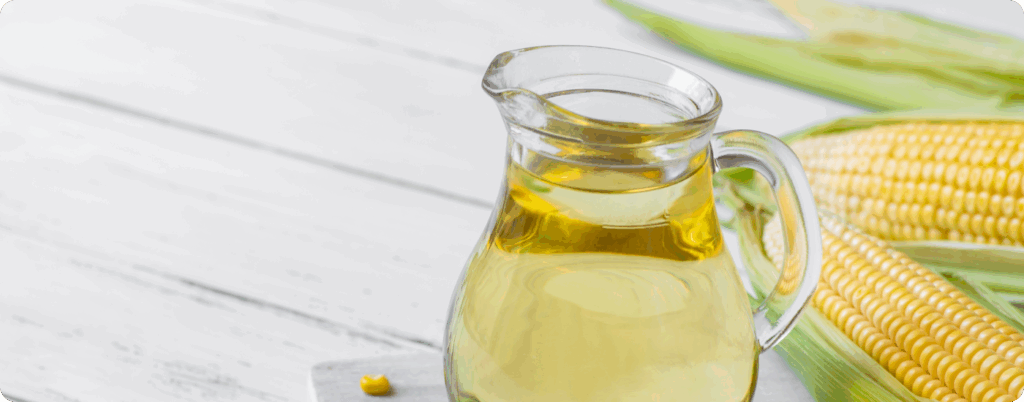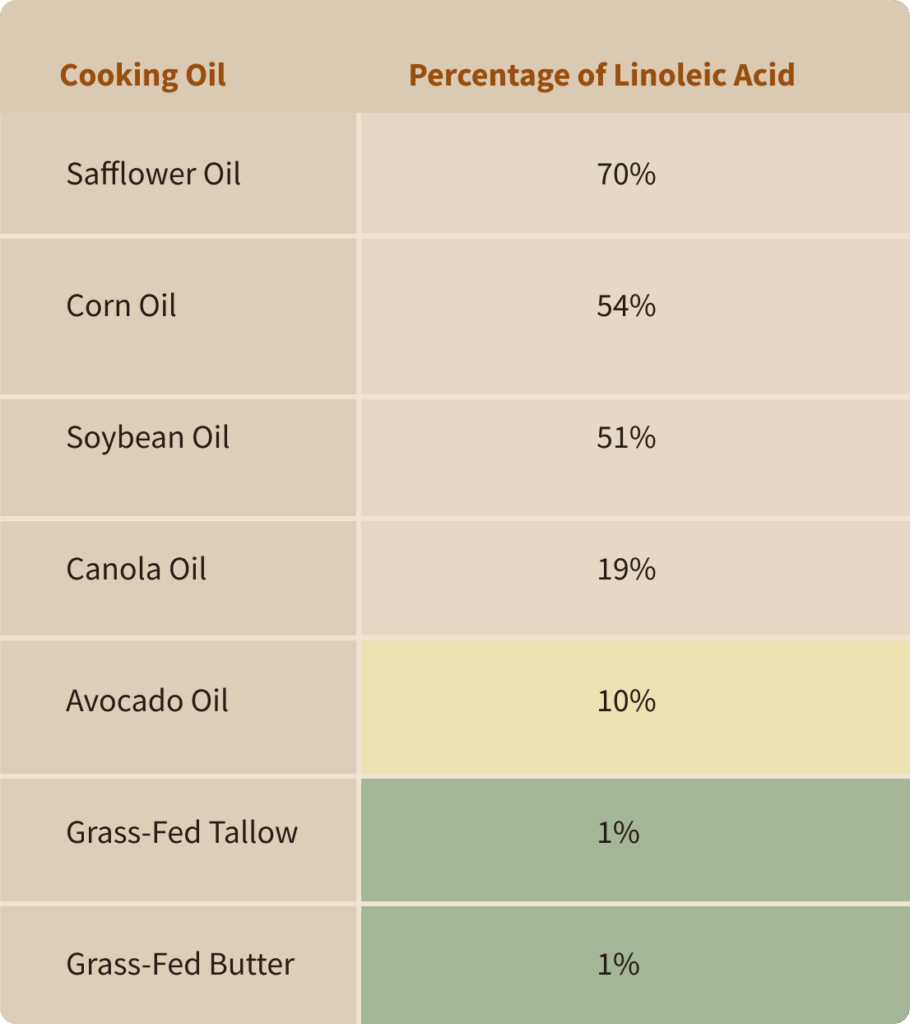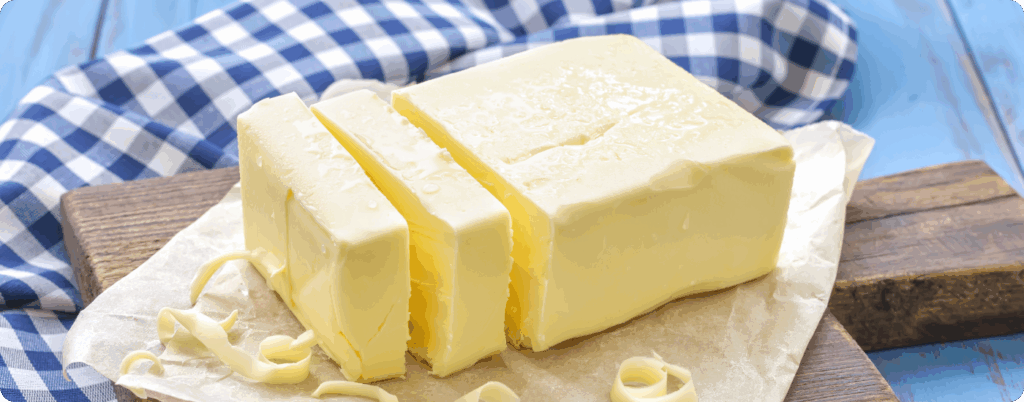PLEASE NOTE: The information in this blog is for educational purposes only. It is not a substitute for professional medical advice. Consult your healthcare provider if you’re seeking medical advice, diagnosis, or treatment.
Have you ever driven through rural America and wondered what all this corn is used for? The answers may surprise you.

Over 60% of corn grown globally is used as animal feed (1), while the rest is turned into a wide variety of products. One of the most prominent modern-day uses is for corn oil. As we’ll see, this cooking oil has taken the world by storm and has found its way into grocery stores, restaurants, and ultra processed foods.
Despite its presence in just about every corner of the food supply, the question still remains, “Is corn oil healthy?”.
In this article, we’ll explore this question, learn how corn oil is made, consider its potential dangers, and discover the best alternatives to use instead.
What is Corn Oil?
Corn oil is a popular seed oil used for deep-frying and cooking. It’s produced from the germ of corn kernels (2). Corn oil is generally viewed as a healthy cooking oil, given that it has a high smoke point, contains vitamin E, and may help lower cholesterol levels (3).

However, a closer inspection of corn oil reveals that it may have similar issues to other seed oils, such as canola oil or soybean oil. Corn oil and other seed oils can share common problems: they’re highly processed, chemically extracted, prone to oxidation, and dramatically high in omega-6 fatty acids.
Unlike extra virgin olive oil or butter, which require minimal processing, corn oil production requires harsh chemical solvents and high temperatures (4). This extensive refining process strips away many naturally occurring compounds while potentially introducing contaminants (5).
The recent widespread adoption of seed oils represents a dramatic shift in dietary fat composition that may be connected to rising rates of chronic diseases in Western societies.
Is Corn Oil Healthy? Here’s Why It’s Not
Even though there are a variety of studies showing potential benefits from corn oil consumption, there are several concerns to be aware of. These include:
Fatty Acid Imbalance
The main concern with corn oil is its extremely high omega-6 fatty acid (a type of polyunsaturated fat) content, creating a potentially problematic omega-6 to omega 3 fatty acids ratio. Linoleic acid is a type of omega-6 fatty acid that is especially high in corn oil (6).

The ratio of omega-6 to omega-3 consumption by humans was around 4:1 (or less) until about 100 years ago (7). Current estimates differ, but this ratio appears to be anywhere from 15-20:1 (8, 9) or up to 50:1 (10). Seed oils like corn oil are the primary contributors to these changes.
This excess of omega-6 fatty acids can promote inflammation in the body, potentially contributing to chronic diseases including cardiovascular disease, arthritis, and metabolic disorders (11, 12, 13).
Other seed oils to avoid include canola oil, rapeseed oil, peanut oil, sunflower oil, sesame oil, safflower oil, and grapeseed oil.
Contamination
Another common concern for vegetable and seed oils like corn oil is contamination, yet global consumption of these oils has surpassed 42 million tons each year (14). Corn oil can be contaminated with pesticides, heavy metals, mycotoxins, and other harmful substances (15).
Corn can be exposed to a wide range of herbicides, pesticides, and insecticides. Fat-soluble pesticides used to increase yields and minimize damage from insects can easily find their way into cooking oils (16, 17). Pesticide exposure may contribute to various cancers, endocrine disruption, asthma, and genetic damage (18).

Heavy metals can also find their way into corn oil due to environmental contamination or exposure during packaging, processing, or transport (19).
Heavy metals found in vegetable oils are especially dangerous and may lead to irreversible damage (20). These metals can also lead to cancer, infertility, neurological disorders, cardiovascular illness, and genetic abnormalities (21, 22).
Mycotoxins such as zearalenone are commonly found in corn products such as corn oil (23). Zearalenone has immunotoxic, hepatotoxic, and xenogenic effects and can harm the endocrine system (24).
Animal Study Concerns
Animal studies have also cast doubt on the safety of corn oil. One study noted that mice that overconsumed corn oil developed obesity and fatty liver (25). Another study found that corn oil negatively impacted activity levels and contributed to insulin resistance (26).
Corn oil has even been shown to negatively impact gut and cardiovascular health in hamsters (27).
Oxidation & Deep Frying
Given its use in restaurants for frying, corn oil can be repeatedly exposed to high temperatures. Deep frying can lead to chemical reactions that may create oxidative products or lead to the formation of harmful trans fats (28, 29).

Research in hamsters demonstrated that oxidized corn oil can increase atherosclerotic plaque formation by 62% compared to fresh oil, while also elevating blood pressure and causing vascular inflammation (30).
Thanks to their higher levels of saturated fat, animal fats like butter or tallow are less reactive (31).
The 3 Best Corn Oil Alternatives
If you’re wondering, “is corn oil healthy?” and seeking better options, three traditional animal fats can be used instead. In particular, butter, tallow, and ghee can be flexible, minimally processed alternatives to vegetable oil.
1. Butter

Butter is the oldest known animal fat, and humans have used it for centuries due to its nutrient density and appealing flavor (32). Not only is it tasty, but it also offers beneficial compounds like vitamins A, D, E, and K, conjugated linoleic acid (CLA), vitamin K2, and butyrate.
2. Tallow
Rendered beef fat, or tallow, is one of the most versatile fats you can use, as it’s excellent for frying, baking, or sautéing. Tallow provides vitamins A, B12, D, E, K, and stearic acid (33).
3. Ghee
Ghee, the “darling child of Ayurvedic medicine,” has been used for thousands of years to combat disease and promote longevity (34). It’s even used to treat skin, allergies, and respiratory diseases (35). Like other animal fats, ghee contains vitamins A, E, and K and has antioxidant properties (36).
The Bottom Line: Say No to Corn Oil
The answer to “Is corn oil healthy?” appears to be a resounding no. While corn oil may have some health benefits, like a high smoke point and vitamin E, these advantages are outweighed by health concerns, including high levels of inflammatory omega-6 fatty acids, potential contamination with heavy metals and pesticides, mycotoxin presence, and oxidation during cooking.
Rather than continuing to ask, “Is corn oil healthy?” and trying to reinvent the wheel, consider embracing traditional animal fats like butter, tallow, and ghee. These time-tested alternatives offer superior nutritional profiles and stability and align with dietary patterns that supported human health for millennia before the introduction of industrial seed oils.
Subscribe to future articles like this: